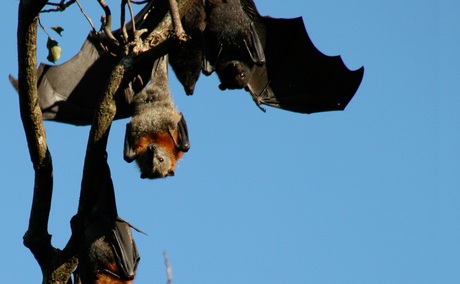What makes bats immune to lethal diseases?

Step aside, Bruce Wayne — it turns out that ordinary bats can be superheroes all on their own.
Researchers have discovered that bats have the unique ability to carry but remain unaffected by lethal diseases. The international research effort included expertise from CSIRO, Duke-NUS Medical School and the Burnet Institute.
Despite acting as a natural host for more than 100 viruses, including Middle Eastern Respiratory Syndrome (MERS), Ebola and Hendra virus, bats do not appear to get sick. According to Associate Professor Gilda Tachedjian from the Burnet Institute, “Not much is known about why bats can harbour these viruses without showing clinical signs of disease.” Until now.
In a study published in Proceedings of the National Academy of Sciences, scientists examined the genes and immune system of the Australian black flying fox. Dr Michelle Baker, a bat immunologist at CSIRO’s Australian Animal Health Laboratory, said the team looked at the defence mechanism known as innate immunity.
“We focused on the innate immunity of bats, in particular the role of interferons — which are integral for innate immune responses in mammals, to understand what’s special about how bats respond to invading viruses,” Dr Baker said.
“Interestingly, we have shown that bats only have three interferons, which is only a fraction — about a quarter — of the number of interferons we find in people.
“This is surprising given bats have this unique ability to control viral infections that are lethal in people, and yet they can do this with a lower number of interferons.”

The team compared two type 1 interferons, alpha and beta, and found that bats express a heightened innate immune response even when they were not infected with any detectable virus — unlike in humans, who activate their immune systems only in response to infection.
“The bats’ interferon-alpha is constantly ‘switched on’, acting as a 24/7 frontline defence against diseases,” Dr Baker said.
“In other mammalian species, having the immune response constantly switched on is dangerous — for example, it’s toxic to tissue and cells — whereas the bat immune system operates in harmony.”
The scientists believe this ability could hold the key to protecting people from deadly diseases. Dr Baker explained, “If we can redirect other species’ immune responses to behave in a similar manner to that of bats, then the high death rate associated with diseases, such as Ebola, could be a thing of the past.”
A scientist, a cooler and a long-haul flight in the fight against MND
Early in January 2026, neuroscientist Dr Rachael Dunlop boarded a flight from Sydney to the US...
Mini lung organoids could help test new treatments
Scientists have developed a simple method for automated the manufacturing of lung organoids...
Clogged 'drains' in the brain an early sign of Alzheimer’s
'Drains' in the brain, responsible for clearing toxic waste in the organ, tend to get...



